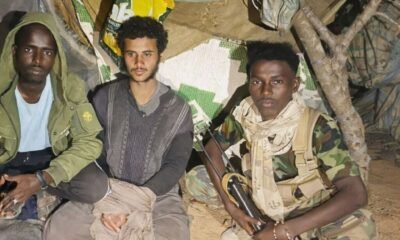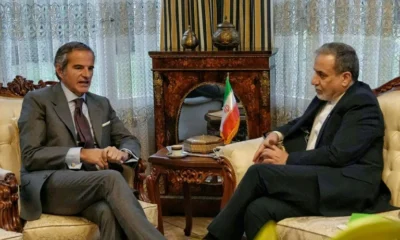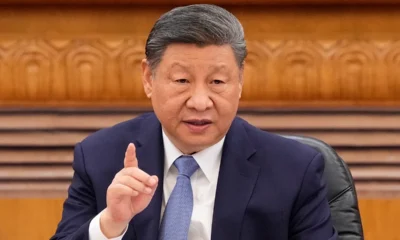Somalia
U.S. Embassy Warns of Imminent Al-Shabaab Threats in Somalia

The U.S. Embassy in Somalia has issued a dire warning about potential imminent Al-Shabaab attacks, particularly targeting Mogadishu’s Aden Adde International Airport and other critical locations. This alert comes amidst a worrying surge in Al-Shabaab’s activities across central Somalia, which have seen the militant group making bold moves towards the capital.
Al-Shabaab has intensified its operations since February 20, orchestrating coordinated assaults across Middle Shabelle and Hiraan regions. The group’s capability to temporarily seize towns, including Balcad, just 30 kilometers from Mogadishu, before being ousted by Somali forces, underscores significant vulnerabilities in Somalia’s defense strategy against insurgents.
In response to these escalating threats, the U.S. Embassy has halted all personnel movements and continues to enforce a Level Four travel advisory, which discourages U.S. citizens from traveling to Somalia. The advisory cites multiple dangers including crime, terrorism, civil unrest, and health risks.
The Somali government, supported by airstrikes from U.S. Africa Command (AFRICOM), has actively engaged the militants, reportedly eliminating over 130 insurgents in recent conflicts. Despite these efforts, Al-Shabaab’s resilience and tactical presence in government strongholds highlight ongoing challenges.
The U.S. Embassy’s alert cautions that Al-Shabaab remains capable of executing kidnappings, bombings, and assorted attacks without warning. Places frequented by Westerners—hotels, restaurants, and shopping areas—are particularly at risk. The advisory underscores the importance of vigilance, recommending that U.S. citizens in Somalia maintain a high level of security awareness and register with the Smart Traveler Enrollment Program (STEP) for updates.
This situation poses profound implications for Somalia’s stability and efforts to combat terrorism within its borders. The ability of Al-Shabaab to carry out high-profile attacks not only challenges the Somali government’s control but also affects regional security dynamics, influencing international relations and aid strategies in the Horn of Africa.
As the situation develops, the international community remains watchful, and the efforts to curb the militant threat continue to be of paramount importance for ensuring peace and security in the region.
Somalia
Man Sentenced to Three Years for Defrauding EU Mission in Somalia

A fake email. A diverted bank transfer. Nearly €70,000 stolen from an EU mission in Somalia — now a prison sentence follows.
A Spanish citizen has been sentenced to three years in prison for impersonating a service provider to the European Union Capacity Building Mission in Somalia in order to fraudulently obtain funds, following an investigation by the European Public Prosecutor’s Office (EPPO) in Madrid.
The case involved funds allocated to EUCAP Somalia, a mission tasked with supporting the Federal Somali Police Force and strengthening maritime security and law enforcement capabilities in Somalia.
According to prosecutors, on December 27, 2022, the defendant sent an email to the EU mission posing as a legitimate supplier of medical and laboratory equipment. In the message, he requested that the next scheduled payment be transferred to a different bank account — one under his control.
Authorities said he had obtained key operational details from an unidentified third party, enabling him to execute the fraud. On January 9, 2023, €69,751.40 was transferred into the account he controlled.
In addition to the three-year prison sentence, Criminal Chamber Two of Spain’s Audiencia Nacional imposed a fine calculated at €10 per day for 10 months. The court also ordered the defendant to reimburse the full amount unlawfully obtained.
The verdict, issued on February 9, 2026, marks the first conviction handed down by a Criminal Chamber of the Audiencia Nacional following an EPPO investigation in Madrid. The ruling remains subject to appeal.
The EPPO is the European Union’s independent prosecution office, responsible for investigating and prosecuting crimes affecting the EU’s financial interests.
Comment
Turkey’s Expanding Military Role in Somalia Raises Strategic Questions for Somaliland

Ankara says “stability.” Somaliland sees risk. The Horn of Africa is entering a new strategic chapter — and the stakes are rising fast.
When Turkish warships docked in Mogadishu, alongside reports of F-16 fighter jet deliveries and offshore drilling plans, the signal was unmistakable: Ankara is deepening its footprint in Somalia. For Somaliland — whose collective memory still carries the trauma of the 1988 bombardment of Hargeisa by the regime of Siad Barre — the optics alone are unsettling. Military expansion in Mogadishu is rarely viewed as defensive. It is viewed through history.
Yet a sober assessment of the Turkey–Somalia defense and economic framework suggests a more complex reality. Turkey is unlikely to launch — or support — an offensive campaign against Somaliland. The strategic costs would be immense.
As a key member of NATO, Ankara positions itself as a regional stabilizer, not a proxy combatant in Somalia’s internal territorial disputes. An unprovoked escalation against a relatively stable and democratic territory with informal ties to the United Kingdom, the UAE and Ethiopia would undermine Turkey’s diplomatic standing at a time when it seeks influence across Africa and the Red Sea corridor.
Economics also act as a restraint. Turkey’s maritime doctrine — often described as the “Blue Homeland” — prioritizes sea lanes, energy access and trade routes. A regional war would jeopardize precisely the offshore prospects and shipping stability Ankara hopes to cultivate. Investors do not drill in active conflict zones.
Ethiopia further complicates any military calculus. Somaliland’s memorandum of understanding with Ethiopia creates a deterrent layer Ankara cannot ignore. Turkey maintains significant economic and defense ties with Addis Ababa; it is unlikely to risk indirect confrontation over Mogadishu’s maximalist claims.
Still, the danger lies less in intent than in imbalance. Advanced aircraft in a fragile security environment introduce new variables. Even if initially deployed against Al-Shabaab, the capability itself alters regional power equations. History in Somalia has shown how quickly state assets can be redirected.
Maritime cooperation carries similar risks. If Turkish-trained Somali naval units patrol waters claimed by Somaliland — particularly near the vital Berbera corridor — even minor incidents could escalate into diplomatic crises.
The most combustible element may be energy exploration. Should Turkish drilling vessels operate in offshore blocks Somaliland considers within its jurisdiction, a commercial venture could morph into a sovereignty dispute with international implications.
Turkey is not preparing an invasion. It is consolidating influence — military, economic and maritime — in a strategically vital region. For Somaliland, the challenge is not alarmism but strategy: direct engagement with Ankara, stronger regional integration with Ethiopia, and early internationalization of maritime boundary concerns.
In the Horn of Africa, power shifts rarely announce themselves loudly. They unfold quietly — until they don’t.
Somalia
Plane Crashes After Takeoff at Mogadishu Airport

A passenger aircraft operated by Starsky Airline crashed on Tuesday at Aden Adde International Airport shortly after takeoff, but all passengers and crew survived, Somali aviation officials said.
The plane was en route to Galkayo when it suffered a technical malfunction immediately after departure, forcing the pilot to attempt an emergency return to Mogadishu.
The Somali Civil Aviation Authority confirmed that everyone on board was safely evacuated and that there were no fatalities.
“The pilot tried to land the aircraft back in Mogadishu, but after touchdown he was unable to maintain control,” said Ahmed Moalim Hassan, director general of the authority. “The aircraft overshot the runway and came close to the shoreline. There were no casualties.”
Initial reports indicated around 50 passengers were on board. Emergency teams responded quickly and evacuated all occupants.
Aviation officials said an investigation is under way to determine the exact cause of the crash.
The incident adds to concerns about aviation safety at Aden Adde Airport. In April last year, a UN-chartered aircraft made a belly landing at the same airport after its landing gear failed to deploy.
Somalia
Aid Destroyed, Trust Shattered: Somalia Loses U.S. Support for Good
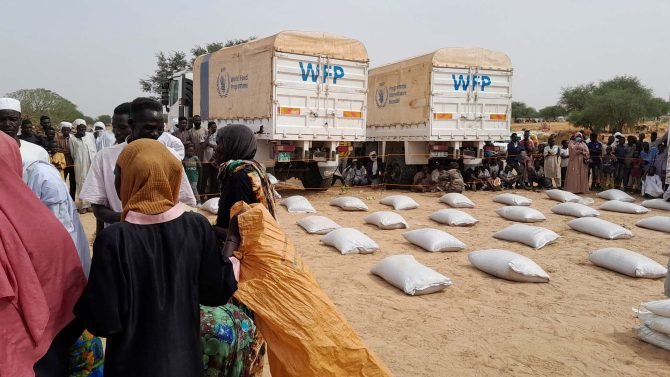
United States to Permanently End Aid to Somalia After Government Destroys U.S.-Donated Food.
The collapse of Somalia’s aid relationship with the United States is no longer hypothetical — it is now policy.
Washington is moving to permanently end U.S. assistance to the Somali Federal Government after authorities in Mogadishu demolished a World Food Programme (WFP) emergency warehouse containing 76 metric tons of U.S.-donated food, a decision approved at the highest levels of government. According to a U.S. diplomatic cable, the destruction likely rendered the food unusable and directly violated donor agreements and UN diplomatic protocols.
This was not a technical mishap. It was a sovereign decision taken without coordination with the United States, the WFP, or other international donors — and it has triggered consequences Somalia can no longer deflect or delay.
The State Department has already paused all assistance benefiting the Somali Federal Government, making clear that accountability and compensation were prerequisites for any resumption. According to senior U.S. officials, that resumption is now off the table entirely, with all U.S. aid expected to end permanently by May.
The implications are severe. U.S. assistance has been a financial and operational backbone for Somalia’s government — from food security and humanitarian relief to institutional support and logistics. Losing it permanently signals not just donor fatigue, but a complete breakdown in trust.
Equally damaging is the international signal. The United Nations World Food Programme has formally classified the demolition as a breach of UN diplomatic protocols, placing Somalia in direct violation of the norms that underpin humanitarian access worldwide. This risks contagion: other donors may follow Washington’s lead rather than assume similar political or reputational exposure.
At a moment when Mogadishu is already diplomatically isolated, struggling with internal legitimacy, and dependent on external support, this decision reinforces a growing perception among partners that the federal leadership is unpredictable, unaccountable, and hostile even to lifesaving aid.
This is no longer about food destroyed at a port. It is about a government that has crossed a red line with its most critical donor — and is now learning that international patience has limits.
Editor's Pick
Hassan Sheikh’s Fatal Obsession: Why Somaliland Haunts Him More Than al-Shabaab

Jealousy in Villa Somalia: Hassan Sheikh’s War Against Somaliland’s Democracy.
Somalia’s President Hassan Sheikh Mohamud has become a prisoner of his own jealousy. Two years into his second term, he has turned Villa Somalia into a war room not against al-Shabaab, famine, or corruption — but against Somaliland’s democracy.
It is the bitter irony of Mogadishu politics: Somaliland has what Hassan Sheikh craves but cannot build. Elections, functioning institutions, stability — the very pillars of a state. And each time Hargeisa strengthens its democracy, Hassan Sheikh’s insecurity deepens. Instead of fixing Somalia’s crumbling foundations, he wastes his energy trying to sabotage Somaliland’s international rise.
Diplomats whisper of a leader consumed by comparison. When Somaliland engages Ethiopia, he panics. When Congress debates travel advisories, he rages. When Somaliland’s army parades discipline, he lashes out with propaganda. It is envy in plain sight.
Meanwhile, Somalia under Hassan Sheikh has become what critics call “Somalia, Inc.” — a company run on begging contracts and aid trips. He has circled the globe signing pledges with Qatar, Turkey, and Egypt, but what has it delivered? More debt, more dependency, and more humiliation. He acts like a traveling salesman while Mogadishu rots under insecurity and corruption.
And yet, he keeps returning to his favorite target: Somaliland. His strategy is one of projection — blame Somaliland, block Somaliland, bury Somaliland. But the more he tries, the more the world notices Hargeisa’s difference. Somaliland is not perfect, but next to Mogadishu’s chaos, it shines.
This obsession is Hassan Sheikh’s fatal flaw. It exposes his weakness, isolates his diplomacy, and leaves Somalia unprepared for the storms ahead. Ethiopia is openly discussing Red Sea access. Egypt and Eritrea are arming Somalia’s fragile government. Al-Shabaab still controls swathes of land. Yet Villa Somalia’s energy is wasted on fighting a neighbor that long ago outpaced it.
The humiliation runs deeper. By attacking Somaliland, Hassan Sheikh admits — without saying it — that Somaliland is real. If it were not, why fear it? Why obsess over it? Why chase every foreign leader to block recognition? His jealousy has become Mogadishu’s foreign policy, and it is destroying him.
And here is the grim prediction: the president after him will be worse. If Somalia survives Hassan Sheikh’s term, it will inherit a broken state, an isolated diplomacy, and an army of resentments. Somaliland, meanwhile, will march on.
Somalia
Is Somalia’s Oil the Price of Loyalty to Turkey? MP Blows Whistle on Explosive Oil Deal
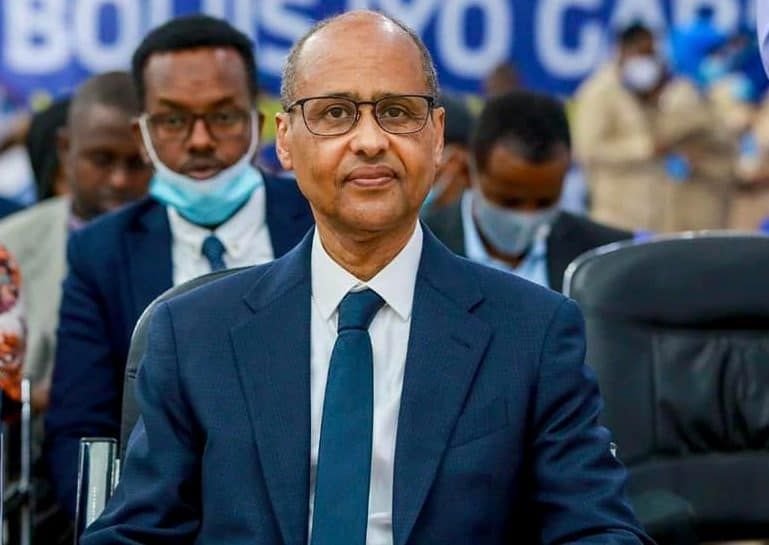
Whistleblower reveals President and Speaker approved secret deal granting Turkey control over 90% of Somalia’s oil and gas — triggering calls of betrayal and neo-colonialism.

“90% Giveaway”: Somalia’s Oil Surrender to Turkey Sparks Outrage in Parliament
A Somali MP has exposed explosive claims implicating the President and Speaker in a secret oil deal with Turkey that hands 90% of Somalia’s hydrocarbon wealth to Ankara. National sovereignty and political accountability now hang in the balance.
The Federal Parliament of Somalia has been rocked by an explosive declaration from MP Dr. Abdillahi Hashi Abib, who publicly accused President Hassan Sheikh Mohamud and Speaker Sheikh Adan Madobe of surrendering 90% of Somalia’s oil and gas wealth to Turkey in a secretive deal that he claims undermines the very sovereignty of the nation.
Standing before the House of the People, Dr. Hashi, a respected member of the Foreign Affairs Committee, revealed that a whistleblower from inside Villa Somalia had furnished him with credible documentation showing both the President and Speaker gave their approval to a deeply controversial hydrocarbons agreement that grants Turkey the lion’s share of Somalia’s natural resources — leaving the Somali people with only a token 10%.
He further disclosed that the President is reported to have defended the lopsided agreement as being “in the best interest of the nation,” a justification that Dr. Hashi forcefully condemned as “a veiled act of neo-colonialism.”
But the accusations don’t stop there. Dr. Hashi warned that in the coming days, he will release notarized documents showing that Ziraat Bank of Turkey violated Somali banking laws, operating under the radar with what appears to be unauthorized coordination with the Central Bank of Somalia.
The implications are staggering. If substantiated, this agreement not only strips Somalia of control over its future economic engine but also potentially violates constitutional procedures, sovereignty norms, and economic governance principles.
Dr. Hashi’s rallying cry was blunt:
“Have the President and the Speaker fulfilled their solemn constitutional oaths to safeguard the interests and sovereignty of the Federal Republic of Somalia?”
Public outrage is mounting. Many in Mogadishu and the wider Somali diaspora are now calling for an emergency parliamentary investigation. Critics are framing the deal as an act of economic treason—a continuation of foreign domination disguised as partnership.
With his final words, Dr. Hashi warned:
“Stay vigilant. The truth will be revealed.”
The Somali public is waiting — and the storm is just beginning.
Oil, Betrayal & Invasion: Somalia’s Secret Coup in Lasanod Unmasked
Turkey’s Somali Oil Grab: A Strategic Coup or Neocolonial Exploitation?
How Turkey’s Strategy in Africa Capitalizes on Anti-Western and Anti-China Sentiments
Turkey to Deploy Frigates to Guard Energy Exploration Ship in Somalia
Somalia and Turkey Have Signed Intelligence-sharing Agreement
Comment
Will Israeli Jets Be Called to Bomb Al-Shabab and ISIS?

Somalia has condemned Israel in the halls of the United Nations. Its ambassador in New York, Abubakar Osman Baale, branded the recent Israeli strike in Doha as a “direct threat to the sovereignty of Qatar.” Mogadishu’s words were clear and defiant: solidarity with Qatar, denunciation of Israel.
But behind the rhetoric lies a far darker, more immediate truth: Somalia is being strangled by Al-Shabab in the south and ISIS offshoots in Puntland’s rugged north.
And no country has mastered the art of precision counterterror warfare more effectively than Israel.
It is a paradox too sharp to ignore. Somalia rails against Israel in public forums, while in private it struggles to contain one of the deadliest extremist insurgencies in the world. Al-Shabab’s bomb-makers are innovating faster than the Somali National Army can adapt. In the north, ISIS fighters are embedding themselves in mountain redoubts that Somali forces have failed to root out for years.
Billions of dollars in Western aid and years of U.S. drone strikes have not broken these networks. If anything, the insurgencies are learning, dispersing, adapting.
Now imagine an alternative: Israeli Air Force squadrons, the same F-35s that flew undetected to Doha, conducting surgical strikes against Al-Shabab leadership compounds or ISIS caves in Puntland.
Israel’s Shin Bet and Mossad running the kind of intelligence penetration operations in Somalia that they have perfected in Gaza and southern Lebanon.
Israeli cyber units dismantling Al-Shabab’s online propaganda in days, not years. Somalia’s terror problem would look radically different.
The irony is brutal. To attract more global aid, Somalia must demonstrate that it is crushing terrorists. But its own military capacity is stretched thin, and its international partners are fatigued.
A secret partnership with Israel would be the most effective military shortcut available. Yet Somalia’s leadership clings to its anti-Israel posture, repeating pan-Arab talking points while jihadists tighten their grip inside its own borders.
History suggests this contradiction cannot last. If Mogadishu continues condemning Israel while failing to deliver security, international patience will run out. Already, Western capitals view Somalia as an endless sinkhole of aid, corruption, and unfinished battles.
At some point, leaders in Washington, London, and even the Gulf will quietly ask: why not let Israel do in Somalia what it has done everywhere else—hunt terrorists with ruthless precision?
The prediction is stark: Somalia will face a moment of reckoning. Either it doubles down on public hostility toward Israel and risks watching its territory further consumed by jihadists, or it swallows political pride and quietly courts the very air force it now condemns.
The reality is that no country, not even the United States, has Israel’s unique blend of operational daring, intelligence depth, and battlefield efficiency.
For Somalia, the war against Al-Shabab and ISIS may ultimately be won—or lost—not in Mogadishu’s speeches at the UN, but in whether it can overcome its own political taboos and accept help from the one air force capable of rewriting its security map.
Decades of Espionage: How Israel’s Intelligence Network Crippled Hezbollah
Iran state TV says Haniyeh Assassinated by Short-Range Projectile, Not Bomb
As Assad falls and Iran weakens, Qatar gains influence across Middle East
Inside Israel’s Master Plan: How Nasrallah Was Eliminated in a Precision Operation
Israel Eliminated Nasrallah Along With Other Senior Hezbollah Members
Nasrallah’s Fall: From Israel’s “Favorite Enemy” to a Marked Man
IDF Confirms Elimination of Senior Hamas Leaders in Gaza Strike
The Empire That Never Was: How Iran’s Syria Fantasy Crashed and Burned
Israel Strikes Dozens of Hezbollah Targets in Lebanon After Nasrallah Killing
Arab States Watch Hezbollah’s Deterrence Erode as Israel Restores Military Dominance
Israel’s Secret Red Button Plan Strikes Hezbollah with Devastating Precision
Israel Strikes Yemen’s Houthi Ports in Retaliation as Missile Attack Rocks Israeli Cities
Behind The Scenes of Israeli Attack: Over 100 Aircraft and a 2,000 km Journey to Iran
Israeli Airstrike Sparks Outrage: Hamas Leader’s Family Members Killed in Gaza
Israel Acted on Intelligence to Preempt Hezbollah Attack, Security Source Says
Turkish President Advocates for Islamic Coalition Against Israel
Israel Outraged as Erdogan-Backed Sharaa Gains U.S. Recognition
Will Israeli Efforts Deter the Houthis? – A Strategic Analysis
ISRAEL; Somaliland Could Play a Key Role in Securing The Red Sea
Israel Must Cripple the Houthis—Outsourcing War to Trump Won’t Work
Israeli Helicopter Lands Near Damascus Amid Airstrikes: Reports
Israel’s Largest Airstrike in Yemen: Critical Infrastructure Destroyed in Coordinated Attack
What Happened to Iran’s Bragging About ‘Retaliation’ Against Israel?
Israel to Strike Iran’s Nuclear Sites in 2025 – U.S. Intel Report
Israel’s Strategic Shift: From Iranian Axis to Sunni Jihad Threat
Iran and Turkey’s condemnation of Israel’s role in Syria: The battle for influence
Somalia
Somali Police Arrest 11 Soldiers for Illegal Weapons Possession in Mogadishu
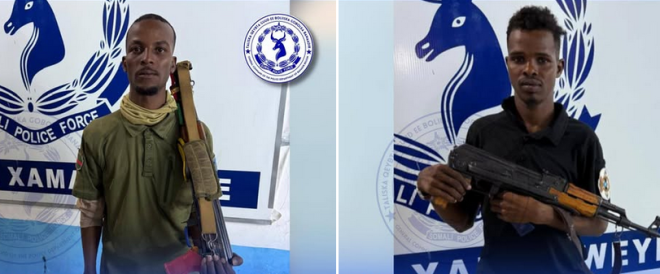
No exceptions. No uniforms off duty. Mogadishu enforces the rules ahead of elections.
Somali police have arrested 11 soldiers in Mogadishu for carrying weapons illegally while off duty, as authorities intensify security enforcement ahead of local council elections.
In a statement, the Banadir Regional Police Command said the detained soldiers violated standing security directives that prohibit off-duty personnel from moving around the capital while armed. The rule is part of broader efforts to reduce civilian risk and prevent unauthorized use of weapons in public spaces.
“The 11 suspects are currently in police custody and will be referred to the appropriate court to ensure compliance with the law and to take the necessary legal measures,” the police command said.
Officials described the arrests as part of a wider campaign to strengthen public security in Mogadishu, where security agencies have renewed enforcement of previously issued orders banning off-duty officers from carrying firearms.
The operation comes as Somalia prepares for local council elections scheduled for Thursday, December 25. Security agencies have announced heightened readiness, with nearly 10,000 police officers deployed to secure polling stations and key locations across the capital.
Speaking to the media, Abdullahi Sheikh Ismail (Farataag), Somalia’s Minister of Internal Security, said the Somali Police Force has finalized comprehensive security plans to ensure the elections are conducted peacefully, safely, and fairly.
Authorities say the enforcement drive sends a clear message that security rules apply to all personnel, regardless of rank, as Mogadishu enters a sensitive political period.
-

 Minnesota2 months ago
Minnesota2 months agoFraud Allegations Close In on Somalia’s Top Diplomats
-

 Middle East2 months ago
Middle East2 months agoTurkey’s Syria Radar Plan Triggers Israeli Red Lines
-

 Editor's Pick2 months ago
Editor's Pick2 months agoWhy India Is Poised to Become the Next Major Power to Recognize Somaliland
-

 ASSESSMENTS2 months ago
ASSESSMENTS2 months agoSomalia’s Risky Pact with Pakistan Sparks Regional Alarm
-

 Analysis2 months ago
Analysis2 months agoTurkey’s Expanding Footprint in Somalia Draws Parliamentary Scrutiny
-

 Analysis2 months ago
Analysis2 months agoRED SEA SHOCKER: TURKEY’S PROXY STATE RISES—AND ISRAEL IS WATCHING
-

 Somaliland1 month ago
Somaliland1 month agoF-35s Over Hargeisa: The Night Somaliland’s Sovereignty Went Supersonic
-

 Somalia2 months ago
Somalia2 months agoIs Somalia’s Oil the Price of Loyalty to Turkey? MP Blows Whistle on Explosive Oil Deal


